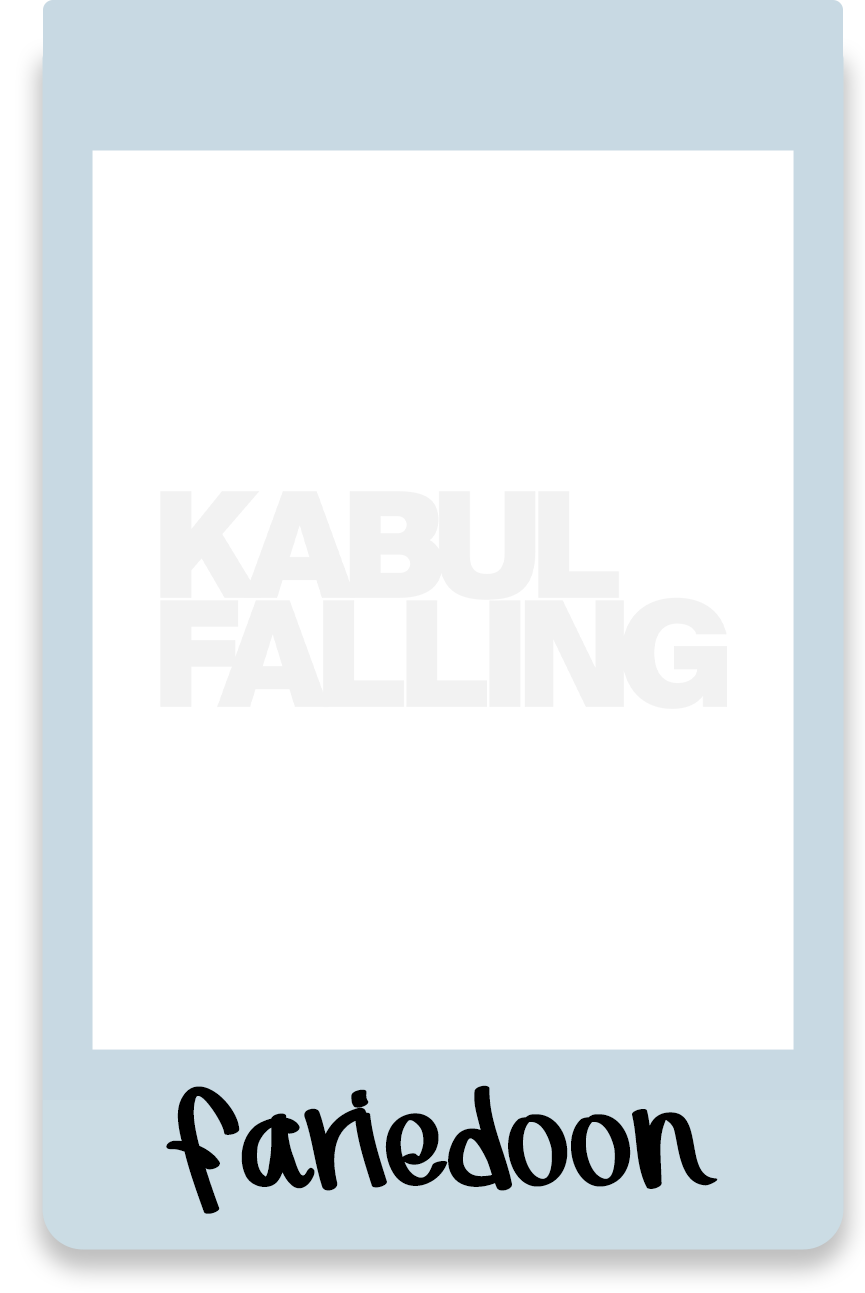“They found us. And then they knocked the door and asked all the men to leave, to come out from the house. And we really scared and we lost ourself. What will happen, the Taliban? Because it was the first time since they came to the power I faced Taliban face to face. So everybody really scared. And finally, we had to go and talk to them. They ask us what are you doing here? Why you are leaving your country? So you wanted to leave the country illegally. Then they took our names and wrote our addresses, everything, the information. So then they told us, you just stay here. You cannot move from this house at the moment. So it was really scary time. The women were crying and all men really scared.”
“My name is Fariedoon Hakimi, son of Abdul Hakim. I was born on October 12, 1985 in Kabul, but my father’s family is from Farah, Afghanistan. My father was an engineer who worked with the government and various non-profits for more than 45 years to support his family. Our life was normal, average, but we were very happy. I have three brothers and three sisters. My mother lives with me, but unfortunately, my father passed away two years ago.
My family moved from Kabul to Farah when I was a child and the civil war was just beginning. I started my education at a village school there, and graduated top of my class from Abu Abdullah Taqi high school. But when I took the university entrance examinations, I couldn’t achieve high enough scores to continue my education in my chosen field of economics. I was offered a course in literature, but I wasn’t interested in that at the time. I decided to start a business, but my father was against that, because he wanted me to continue my higher education in literature. I was an emotional young man, and I didn’t listen to him. Instead, I moved to Herat and started a business selling car parts with one of my relatives. My father loved me a lot, so despite disagreeing with my choice, he gave me some money to start that business. Unfortunately, I had a motorcycle accident and broke my left leg. I was hospitalized for a long time and couldn’t run my business properly, and our company failed.
After a three-year gap, I decided to go back to university. I won a scholarship through Afghanistan’s Ministry of Education based on my old high school scores. I graduated from Panjab University in Chandigarh, India in 2012 with a degree in commerce. While at university, I was President of the Afghan Student Association, representing the 150 students from my homeland who were in our program.
When I returned to Kabul, I quickly got a job as a senior planning and procedures officer in Afghanistan’s Independent Election Commission. I worked in the main office in Kabul for one year, overseeing the team. Then, I received another scholarship from the Indian government, and in 2015, I received a two year master’s degree in business administration with a specialization in international business from the University of Mysore.
When I returned to Kabul again, the job market was bad. Eventually, I found a great job at an international project with non-profits and USAID. I worked with them as a public administration advisor, first based in Farah province and then in Parwan province. My team was responsible for coaching, mentoring, and training government staff across the two provinces. We also advised the governors on various administrative and governmental affairs. During my five years in this position, I worked with five different governors, but our team stayed the same, increasing our responsibilies and figuring out how to work well with everyone.
In January 2021, our project ended. I wanted to start my own business – to hire people and not be hired by the people. I bought a third of the shares in my brother’s architectural firm and become a partner. We expanded the business by offering furniture and home décor to customers. In time, I became the company’s general manager. I was just six months into this new position, and we were finally at the stage of success we had dreamt about, when everything changed.
On August 15, 2021, when the government failed and the Taliban took power, I knew my whole family was in danger. The U.S. government started evacuation flights from Kabul. I was told that I was one of their priority cases because I have a Special Immigrant Visa application pending in the U.S. Even so, I didn’t want to take a risk. I knocked on a lot of doors and leaned on my connections and eventually I was introduced to a U.S. senator who promised to help evacuate us from Afghanistan. Every day, I had phone calls and exchanged emails with dozens of connections, but none of the leads ever panned out.
Fortunately, and finally, I was introduced to Danna Harman, an Israeli journalist who helped us evacuate from Afghanistan. She is the real hero of our lives and hundreds of others, and I call her an angel. She and her team helped us leave the country on September 29, 2021. During this harrowing journey out of Afghanistan, I learnt some new things about myself and realized that I’m a natural team leader. We were supposed to go overland to Tajikistan through the Shirkhan border in Kunduz province, but the plan went wrong and the person inside Afghanistan who was responsible for this mission failed, because he couldn’t coordinate properly with the Taliban. He left us, and we were forced to face the Taliban ourselves. There was suddenly no one leading the group. I decided to try to take on that responsibility, even though I was with my elderly mother, wife, and two children, and all of them were very scared. But with the Danna’s encouragement over the phone, I took the lead and managed to lead the entire group of 125 people to safety, thank God. Meanwhile, the Israeli team on the Tajikistan border tried to figure out a new plan. Soon, I led the group out of Kunduz, overland to Mazar, and onto a last minute charter flight to Tajikistan. Three days later, as we were sleeping in the airport terminal in Dushanbe, Albania accepted us, and we flew out of the country.
Another 500 Afghans joined our group. We lived together in a refugee camp, and I was nominated as the leader of the entire camp. Our team of six established different committees that worked to address and solve everyone’s problems, ranging from education to child protection, logistics, and health. Today, my family and I live in Canada. We are lucky. ”
Warning: the following content may contain triggering and/or sensitive material depicting war & violence







